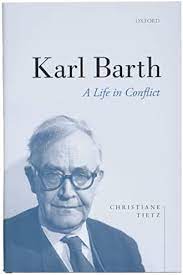“Reformed” Yet Ignorant


When you study church history, one of the striking things is the repetition of certain patterns. Christiane Tietz’s biography of Karl Barth appeared in English last year. It’s a sympathetic portrait of a theological giant. Tietz is clearly an admirer of Barth in terms of his theology so, unfortunately, the critical biblical analysis required is missing. It takes a discerning reader to recognize many of the ways Barth went wrong.
One area where Tietz isn’t shy is the long-term adulterous relationship Barth maintained with Charlotte von Kirschbaum. She describes it as a “troubled ménage à trois.” It was a relationship of which Barth’s wife Nelly was fully aware. After all, Nelly had to learn to accept it when Charlotte moved in their house. Barth tried to justify it theologically by arguing that living in this adulterous relationship guarded him against becoming a legalist (p.223). Karl’s mother, however, wasn’t buying it. She wrote to him, “What good is the most discerning theology when it suffers a shipwreck in your own home” (p.220). Ouch.
But if we circle back to an earlier period in Barth’s life, there are other troubling facts. These don’t seem to bother Tietz. From 1909-1911, Barth served as a vicar in a Reformed church in Geneva. Then, for ten years, from 1911-1921, he served as the pastor of the Reformed church in Safenwil, also in Switzerland. His professorial career began 1921 with his appointment as an honorary professor for Reformed theology in Göttingen, Germany. Notice how he was a Reformed pastor, and then a professor of Reformed theology. Even to this day, Barth is often described as having been a Reformed theologian. That’s why I find it remarkable that, some years after his appointment to Göttingen, he confessed “that at that time I did not even possess the Reformed Confessions, and had certainly never read them” (p.101). Imagine that! A Reformed pastor now appointed as a Reformed professor who’d never read the Reformed confessions. How could it be?
It happened before in the Netherlands. During the early 1800s, men would become pastors in the Reformed Church of the Netherlands without ever having studied the Three Forms of Unity. The story is famously told of a widow in the Reformed church of Ulrum giving a copy of the Canons of Dort to her pastor in 1832. Hendrik de Cock had never seen the Canons before. He went on to republish them on his own dime.
It also happened in the United States, albeit amongst the Presbyterians. After his conversion in 1821, Charles Finney became a member of a Presbyterian church. A short while later he began studying for the ministry. Finney didn’t go to seminary, but studied with a local Presbyterian pastor. In 1823 when Charles Finney appeared before a Presbytery to be examined for licensure. They asked him if he received the Westminster Confession. Surprisingly, he replied that he had never studied it. Still, he thought that he still received it “for the substance of doctrine, so far as I understand it.” Sadly, the Presbytery went ahead and licensed him to preach in the Presbyterian Church. Finney went on to become one of the fiercest opponents of Reformed theology, despite continuing to be a Presbyterian.
There’s a historical pattern of confessional ignorance. That’s not to be pinned on Charles Finney, Hendrik de Cock, or Karl Barth as individuals. That ignorance was an institutional issue. Over time, the Reformed churches of Europe and the Presbyterian Church in the USA lost their confessional moorings. They ended up adrift theologically.
Thankfully, for every Charles Finney there was eventually a J. Gresham Machen. For every Karl Barth, there were men like Klaas Schilder and Cornelius Van Til. They sounded the theological alarm bells. Consequently, praise God, there were ecclesiastical returns to the Reformed confessions on both sides of the Atlantic.
There are two takeaways from this history.
First, churches can have the name Reformed without being Reformed in any meaningful sense. You can call yourself Reformed but not have any Reformed confessional moorings. However, part of the essence of being Reformed is being confessional. Reformed confessions set the parameters of what it means to be Reformed. If those are set aside, “Reformed” comes to mean something generic like “Protestant.”
Finally, beware of the tendency to de-emphasize the Reformed confessions. When Reformed churches no longer practice catechism preaching, that’s a step along the way to deconfessionalizing. When Reformed churches set aside catechism instruction of the youth, that’s moving towards a church Reformed in name only. When the church’s website makes no mention of the Creeds and Confessions as a summary of what the church believes, that ought to be a warning sign.
Being a confessional church is no guarantee of orthodoxy, I realize that. Being a confessional church is no guarantee of gospel-faithfulness. However, when confessions are in their proper place (subordinate to Scripture yet respected and used), they can be a great blessing for the preservation and propagation of the faith once for all delivered to the saints.


